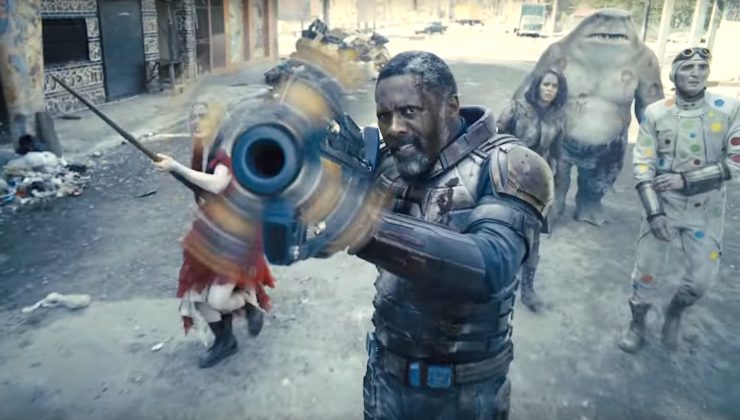Five years ago, DC and Warner Bros. tried their hand at a Suicide Squad film. According to recent complaints made by its director David Ayer, the studio stuck their hands in up to their elbows and botched the movie he was trying to make, a serious rumination on “‘bad people’ who are shit on and discarded[…]”
Which is… one way to handle a crew of misfit hyper-skilled murderous criminals who are sent on missions that they’re not necessarily meant to come back from. The studio cut of Ayer’s film didn’t land well regardless, so DC slammed their “Do Over” button and called in Guardians of the Galaxy director James Gunn for an R-rated guts-and-goo fest that kept elements of the first film, but largely scrapped what came before it.
The result? A lot more fun, for one thing.
[Some spoilers for The Suicide Squad.]
The Suicide Squad gets a lot of points for dropping us into the plot with zero fanfare. Savant (Michael Rooker) is recruited to the squad from Belle Reve Prison by Amanda Waller (Viola Davis) with a few sentences of setup and no more—we know what this story is about, and even if an audience member is coming in fresh, the conceit is hardly difficult to explain. Spending less time on the info-dump allows the movie to jump directly into its action and fill out the relevant character histories from inside the story.
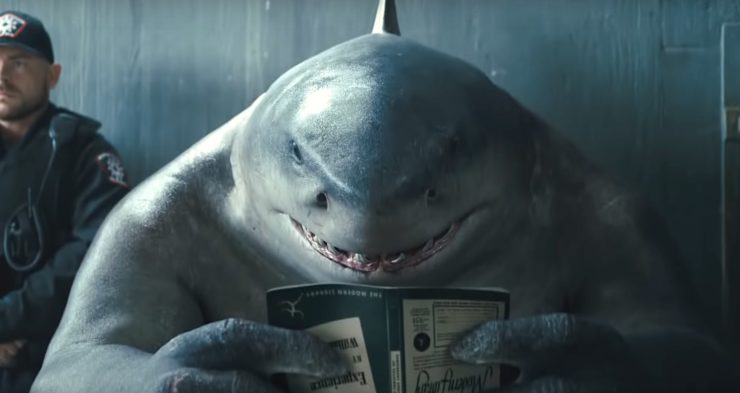
It would be nice if more superhero movies did this, while we’re on the subject. Origin stories are often trite these days, and audiences know what they’re in for by now: The concept of the Suicide Squad isn’t actually a complicated one. It’s more enjoyable to get moving and spend more time with the characters themselves.
Is this technically a sequel to the first film? Yes. No. Technically? But the real answer is honestly: Who cares? The central crew this time around is made up of previous movie alumni Rick Flag (Joel Kinnaman) and Harley Quinn (Margot Robbie), plus newcomers Robert DuBois aka Bloodsport (Idris Elba), Christopher Smith aka Peacemaker (John Cena), Cleo Cazo aka Ratcatcher 2 (Daniela Melchior), Abner Krill aka Polka-Dot Man (David Dastmalchian), and Nanaue aka King Shark (Sylvester Stallone). Most of the film’s emotional weight is carried by DuBois and Cazo, who form a surrogate father-daughter bond to make up for Cazo’s long-dead father (Ratcatcher, played by Taika Waititi) and DuBois estranged relationship with his own daughter (Tyla, played by Storm Reid). There are ideological differences at play, of course, but most of the film’s tone is determined by Gunn’s characteristic group banter, watching these un-meshable personalities find their own ways to get on.
The blend is effective—Quinn and Flag do a good job of anchoring things as the two characters who are already familiar with Waller’s operation and how wrong these things usually go. DuBois, Smith, Cazo, Krill, and Nanaue are stuck trying to prove themselves, though to whom is a matter for the audience to suss out: Is it each other? Waller? Themselves? They have a very short time on the small island country of Corto Maltese—which has been overtaken in a violent coup—to find these things out. And also to stop Project Starfish, the baby of Dr. Gaius Grieves aka The Thinker (Peter Capaldi), which is supposedly an imminent threat to global security.
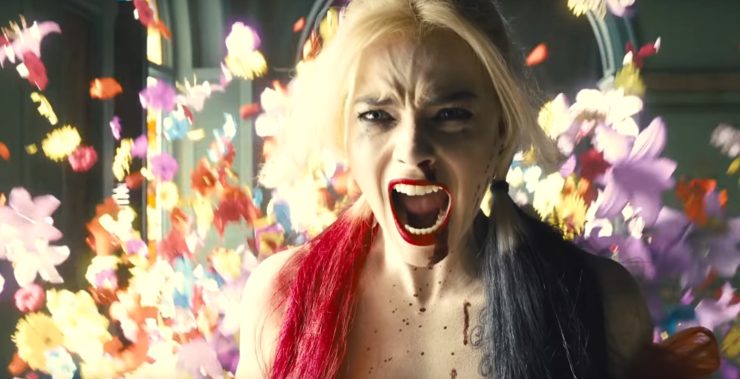
People love to mention the song choices when praising Gunn’s work on Guardians of the Galaxy, but I actually prefer a lot of his cues in The Suicide Squad over Quill’s mixtapes. (The score by John Murphy is also a fun stew of seeming odes to other film soundtracks.) There’s really no better example in the sheer magnitude of departure between Ayer-to-Gunn’s films than the music: The theme for Ayer’s tale is Twenty One Pilots’ “Heathens,” a moody, melancholy ode to outcasts; Gunn choreographs a glorious fight sequence centered on Harley Quinn in a red ballgown surrounded by cartoon flowers and birds as Louis Prima croons “Just a Gigolo” in the background. Both songs have their merits, sure, but the first one takes itself a bit over-seriously, while there’s a cognitive dissonance to the latter that makes for great viewing.
On the other hand, while I adored Harley’s leather gear at the start of the film, and the jacket emblazoned with the words “Live fast, die clown” made me chuckle, I read that Gunn had the opportunity to put her in a motorcycle jacket that read “World’s Best Grandpa” and I simply cannot believe he passed that up. I. I don’t understand. It’s less aggravating than the stilettos she wore for the first film, but one of these choices was correct and the other wasn’t, so how could you go with the former option, is it for branding? It’s for branding, isn’t it. That hurts my heart.
The film’s R rating is largely devoted to CGI gruesomeness, and the sheer volume of carnage might get upsetting or distracting if that’s not something you’re into or can avoid thinking about. (I wouldn’t watch it while eating, if these sorts of things make you nauseous.) There are also a share of jokes and plot points that don’t sit particularly well regardless of the moral grayness of its characters; for example, Polka-Dot Man had a villainous mother who experimented on him, and he is only able to use his powers on others if he imagines they are his mother—and we see this visualization technique from his vantage point at multiple moments in the movie. While the visual is intended to be a point of comedy, when viewed, it is hard not to feel that the true humor of the scenario is making fun of a middle-aged woman’s body in other characters’ clothes.
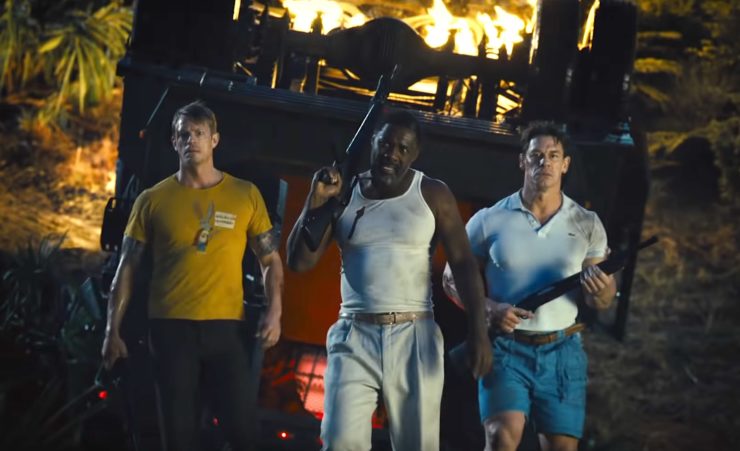
Additionally there’s the question of imperialism and culpability, themes which come up more and more often as filmmakers realize that any plot hinging on events that occur in nations (fictional or not) pummeled by colonialism has a responsibility to acknowledge how powerful countries (like the U.S.) engineer these scenarios to their benefit. We already know that Amanda Waller is a character who has no compunction about doing anything necessary toward the results she wants, so it’s hardly a shock from an audience standpoint when these truths surface… but that’s part of the problem, isn’t it? Acknowledging the reality of these situations is important, but it’s begun to feel common, rote, and easy for viewers to pass over. While The Suicide Squad can hardly be expected to change the world on that front, the trend itself feels more dangerous for its numbing qualities—we need to stay angry.
With all that being said, The Suicide Squad works as a film in a way that its predecessor sadly did not. It’s appropriately ridiculous, over the top, and does not feature an antagonist that guards a large beam of light shooting into the sky. The characters are fun, the gore intentionally overwrought, the superpowers unexplained and often gleefully baffling. Sylvester Stallone is King Shark, and I can say with zero irony that I prefer this to any role he’s ever played.
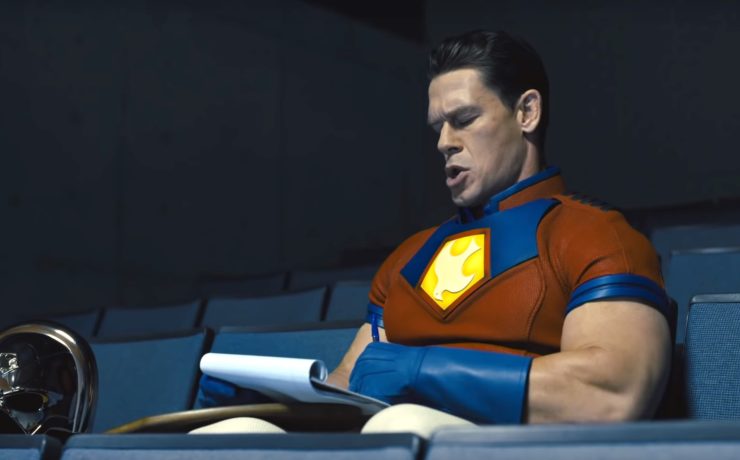
But also, somehow, they’ve decided to make a Peacemaker television spinoff from this. No offense to Cena, but the guy is by far the least interesting character the film offers up. So that’s less exciting. I’d much rather have a sequel.
The Suicide Squad is showing in theaters and on HBO Max.
Emmet Asher-Perrin just can’t figure out why you wouldn’t use WORLD’S BEST GRANDPA. You can bug them on Twitter, and read more of their work here and elsewhere.










